The way he was carrying on, Daniel didn’t see he had any choice but to promise. Seeing the old man in such a helpless state was upsetting. Yet it made him angry, too, because this was not a kid’s business. What right did he have foisting it off on him? It felt like blackmail. “All right,” Daniel snapped, only wanting to shut him up, “so I promise.”
“Good, good,” breathed the old man. But the relief Daniel’s pledge gave Alec was only temporary. He started in again. “Don’t you think we could go?” he wheedled. “It’s not really so far and nobody’s going to stop us. If you’re worried about looking small behind the wheel we can set you up on a cushion so you sit every bit as tall as me. That would do it, don’t you think?”
What Daniel thought could be surmised. He was pointedly ignoring the old man, looking away from him, across the road and into a neighbour’s yard where the storm-shattered limb of an austere and venerable elm dangled, hanging from a pliable shred of the tree’s tough inner bark and twisting in the wind.
“Look at all these flowers made special for Earl,” implored Alec. “Mrs. Harding put a drop of perfume on each of the paper heads so they’d be as near real flowers as can be. What’s the use of these flowers if we don’t go? It’d be a terrible waste. Just smell them,” he coaxed, holding out a few to the boy.
Daniel knocked them aside with the back of his hand. “Look,” he said angrily, “why don’t you just leave me alone? I can’t take you. Why do you keep at me? How many times do you need to be told? Do you want to get me in trouble? Do you believe she won’t find out if I take you? She always finds out!” he cried.
“Daniel -”
But Daniel had finished with him. The boy flung himself out of the truck, slamming the door on the startled face of an old man awash in artificial flowers.
It was shame that drove Daniel to run down the bare, windy road, shame at disappointing someone he had only just that minute realized he loved.

The following Wednesday morning Alec Monkman began to clean his garden. When he started the job the air was keen and thin, so keen and thin that the only smell it could float was the itchy, prickly one of tomato bushes and even that smell drifted in and out like radio reception from a distant station – despite his carrying armfuls of frost-blackened tomato plants directly under his nose.
By nine o’clock the sun was shining with a cold, untempered brightness and the sky was the palest blue, an exact match for the colour of Monkman’s eyes, which seemed intent on reflecting the season. However, Monkman paid no notice of the sky. He was too busy pulling up tomato plants, wrenching stakes out of the obstinate earth and throwing them in a pile in the middle of the garden. In no time at all even this easy work made him grow flushed and warm. It was because he had let himself run to fat, he told himself, prodding his middle. When he turned to the corn patch he was already slowing, visibly tiring. He cleared it as a child might, uprooting each stalk and bearing each singly to the rubbish heap upright in his fist like a withered staff of office, its roots dribbling earth onto his shuffling boots and the drab leaves rustling alongside his ruddy, sweaty, dirt-streaked face. Having deposited a stalk with the rest, he turned mechanically on his heel and trudged back to pull up another. The corn on the rubbish heap stood stacked higher than his head before the plot was eventually cleared and at the close of that task he was sweating so freely that he removed his jacket and, without thinking, tossed it up on the pile, repeating the same motion that had disposed of the last of the corn. The jacket was soon covered by his next load, pea vines, and forgotten.
Clearing was nothing like planting had been. He had gotten confused planting. He hadn’t remembered certain things. But clearing was easy, there was nothing to be confused about. You just took everything up. You worked until all was bare, empty.
Alec worked blindly on. At mid-afternoon, as he approached the last of it, what was left of the cucumbers and beans, the pain in the small of his back grew so sharp that he was obliged to breathe quickly and shallowly through his mouth. Something else. There was a loud, windy roar in his ears whenever he bent over. But he disregarded the pain and the roaring and stumbled about his garden with his nose to the ground like a dog, swinging his head from side to side, suddenly stooping to seize a single parched leaf, a broken twig, the smallest scrap of waste he had earlier overlooked. Back and forth he went, racing the approaching dusk, his breath coming faster and faster, stiff fingers pecking at the dirt, pinching up this or that.
The supper siren wailed from Connaught’s town hall, the dim light was failing. It was time to give up. He could no longer spot the last tiny shreds of refuse and his hands trembled so violently that the only way he could control them was to stuff them in his trouser pockets. The garden was as clean as he could make it. He went into the house and closed the door.

It was a little past noon when Daniel let himself into his grandfather’s house, unannounced, without bothering to knock. Having once lived there, he was inclined to treat it as his own and never give a second thought to the old man’s privacy. Making amends was uppermost in the boy’s mind, not respecting his privacy. He had come to tell his grandfather he was sorry for what had happened and how he had treated him. For a week he had avoided him because he knew, no matter what excuses he made to himself, that he had been afraid and disloyal. Over and over he had asked himself how Montgomery Clift or James Dean would have behaved in his place. The answers always came out the same. Montgomery Clift would have driven the old man wherever he wanted to go, to the ends of the earth. If need be, James Dean would have stolen a car to transport him.
He was a coward.
Because the television wasn’t blaring, at first Daniel assumed the old man must be out. Alec never missed the farm report and markets which were broadcast over the noon hour. Yet despite the utter quiet and stillness of the house Daniel had the sense it wasn’t empty. An unsettling feeling arose in him that he was being watched or listened to.
“Anybody home?” He paused, shouted again. “Anybody home?” He felt a mixture of uneasiness and relief that no one answered and he was free to leave. But as he turned to do so he got his answer, a vague confusion of sounds that came from the direction of the living room, muffled, deliberate thumps; a gritty scrabbling which sounded like a dog’s nails slithering on a polished floor. Then as abruptly as they had begun the sounds ceased. Either that or they had been overwhelmed by the loud, frantic drumming of his heart. Daniel strained to catch them again, face drawn and rigid.
“Who’s there?” he called out.
No reply. The rooms thrummed vacantly. “Alec?”
Nothing.
With reluctance Daniel stole to the entrance of the living room and eased his way through the door for a look. It came as a great relief to him when he saw it was only the old man after all, the old man standing in the middle of the living room with his back to him, leaning on one of the kitchen chairs.
“Alec?”
He did not answer, did not move a muscle.
The boy wondered if this was a display of sulking, a bit of the cold shoulder because he hadn’t got his way last Saturday. Daniel decided to ignore it. “You gave me a scare,” he said brightly to the hunched, brooding shoulders. “Didn’t you hear me call?”
Читать дальше














